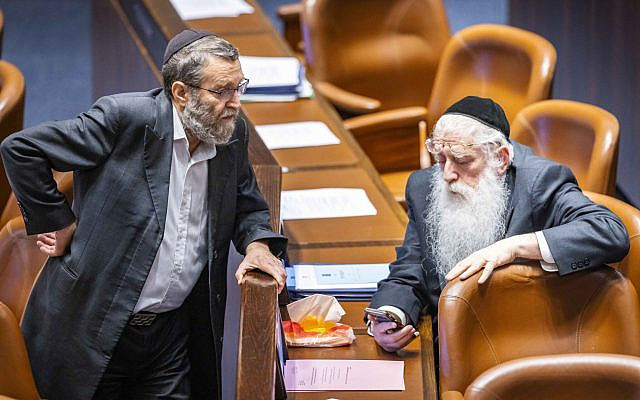A fight for the right to poverty and ignorance
 |
| MK Moshe Gafni (left) with United Torah Judaism party colleague Meir Porush in the Knesset - shnayim ochzin be-smartphone |
The ultra-Orthodox leadership has found an old-new enemy: the state-Haredi education system. Last week, United Torah Judaism MK Moshe Gafni said: “There will be no such thing as ‘state-Haredi’ education.” Rabbi Gershon Edelstein, leader of the Lithuanian ultra-Orthodox public, went him one better by asserting that “those who teach in state-Haredi schools lose their place in the world to come.”
To the outside observer, this looks like yet another petty Haredi civil war. In reality, the consequences of that war for Israel are enormous. Victory would leave the ultra-Orthodox sector poor and insular, making an ever-smaller contribution, relative to its size, to the State of Israel and Israeli society.
Twenty-five percent of children enrolled in Israel’s Hebrew education system are ultra-Orthodox, and the number is growing at a rate of 3.7% per year (compared to 2.3% in the rest of the education system). The vast majority of Haredi children, 96%, study in unofficial ultra-Orthodox institutions. These institutions maintain only the weakest of links to the state system. Their curriculum generally does not include a full slate of core studies, if any at all; their supervision is lax or non-existent, and their connection to the state is mostly budgetary. Their administration is a failure and, in many cases, they are a source of income for wheeler-dealers no less than they are educational institutions. In a nutshell, this is a chaotic system run according to mid-20th century standards.
In 2014, Education Minister Shai Piron established the state-Haredi education system. The idea was to incorporate the ultra-Orthodox education system into the Israeli system, apply state supervision standards to it, and establish a more binding and meaningful core studies framework – to start transforming Haredi education from an extraterritorial system to a part of the state. The idea sounds proper and logical, but in practice it has had little success. Today, only about 3% of ultra-Orthodox schools belong to the state-Haredi education system. Of these, a large majority are affiliated with marginal Haredi streams such as Chabad, Breslov, or other small groups. The ultra-Orthodox mainstream is not there.
In recent years, following an increase of less conservative Haredim who desire that their children receive an education that will allow them to live above the poverty line, there have been attempts to establish state-Haredi schools in several major ultra-Orthodox population centers. These parents want their children to be educated in a more modern system that meets, at least, minimum standards of both curriculum and physical facilities, and which is part of the State of Israel.
Despite the marginality of this emerging current in ultra-Orthodox education, the Haredi leadership is waging a war of attrition. Attempts by parents in ultra-Orthodox cities to open such schools run into a brick wall. The municipal systems struggle with this, and the community condemns any parent who promotes such initiatives or sends their children to these schools. The words of MK Gafni and Rabbi Edelstein animate this Haredi horror show.
And they know why. The ultra-Orthodox education system is the power base of the Haredi leadership. Upholding ignorance and preventing Haredi boys from acquiring the ability to earn a decent living; preserving the communal regime that controls parental behavior through educational institutions and admission to them; the great budgetary “milking” operation that supports masses of ultra-Orthodox political hacks and dynastic courts.
All of these are necessary conditions for maintaining the ultra-Orthodox “system.” If that system should – heaven forfend! – become subject to supervision, core studies would be instituted which, in turn, would prepare students for further education in remunerative fields and enable lucrative careers – and that would make it impossible for rabbis and wheeler-dealers to control who gets accepted where. They know the entire edifice would collapse on their heads.
Haredi Jews currently constitute 13% of the Israeli population (1.22 million), and their median age is 16. If drastic change doesn’t occur soon, and if the current vectors of non-education, non-involvement in Israeli life, and non-participation in military/national service and the labor market continue unabated, Israel will collapse under this increasingly untenable burden and become an entirely different place within a few years’ time.
Strengthening the state-Haredi education system is a potential tool for change. If the next government to be formed is not encouraged to do so, it may be too late for those that follow. But the responsibility also lies with those many Haredim who want state-Haredi education but are afraid. If they don’t confront their leadership – which cares nothing for their well-being – neither they nor the state will survive.



2 comments:
All they have to do is wait for November when Bibi gets another chance to form the government and give them the keys to the treasury again.
Everyday I thank G_d that I was not born ultra-orthodox, and that my children and grandchildren were not sucked into the cult.
Post a Comment